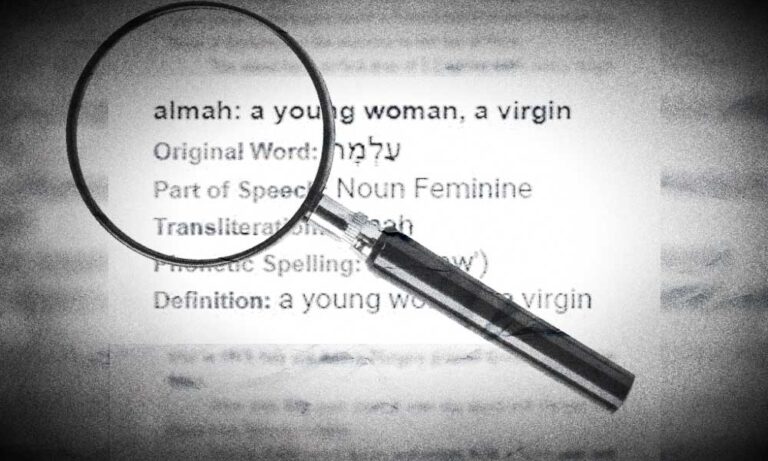After spending seven years working at a Jewish parenting website, Molly Tolsky decided to create a platform for young Jewish women who are focused on their careers and their place in the world, rather than on marriage or children. In her search for a site name, she came across alma, which perfectly encapsulated what she was looking for.
Almah or alma (המְלַע ’almāh) is a Hebrew term that refers to a young woman, specifically a young woman of childbearing age. Some interpretations suggest that an almah is unmarried, while others believe she is a woman capable of having children but has not yet done so. The word almah has also been translated as “virgin.”
The term almah appears nine times in the Hebrew Bible. For example, in Genesis, Rebecca is described as the almah who passes the test to become Isaac’s bride. In Exodus, an almah (Miriam) plays a crucial role in guiding baby Moses down the Nile.
When translated into Greek in the third and second centuries BCE, most instances of almah were translated as neanis (young woman) or neotes (youth). However, in two cases, almah was translated as parthenos, meaning virgin. Scholars argue that the Hebrew word for virgin is actually betulah, not almah, indicating possible mistranslations. The translation of almah to “virgin” (via parthenos) in Isaiah 7:14 has been cited as evidence for the virgin birth of Jesus.
A biblical translation of almah has been offered as proof of the virgin birth of Jesus.
In that verse, Judean King Ahaz is under attack by the rulers of Israel and Syria. The prophet Isaiah assures Ahaz that a boy will be born to an almah, and this child will lead to the aggressors withdrawing from Jerusalem. This prophecy is echoed in the New Testament Gospel of Matthew, where an angel informs Joseph that Mary will conceive by the power of the Holy Ghost and give birth to a son who will save his people. This aligns with the prophecy in Isaiah, emphasizing the virgin birth of Jesus.
Miriam watching over her infant brother Moses (Photo credit: Miriam. 2022, October 22. In Wikipedia. https://en.wikipedia.org/wiki/Miriam)
Revised translations now render almah as “young woman,” a view held by many scholars. Marvin Sweeney, a professor of the Hebrew Bible, asserts that almah comes from the root `lm`, which can mean “hidden” and likely refers to the hidden power of creating life.
Despite scholarly consensus, societal expectations have often idealized virginity for young unmarried women. Filmmaker Therese Shechter challenges these ideas about womanhood in her documentaries, such as the 2013 film How to Lose Your Virginity, which explores the myths and misogyny surrounding sexual purity. She notes that in many languages, words like almah encompass both young woman and virgin, reflecting a preoccupation with women’s marital status, reproductive capabilities, and sexual history.
The word alma (without the “h”) has gained contemporary relevance through Tolsky’s website, Hey Alma, launched in 2017 by 70 Faces Media. Described as “Jewish, feminist, and full of chutzpah,” the platform resonates with young women of childbearing age who have not yet had children. Tolsky saw this as a perfect fit for their target audience and the specific definition of alma.
Is there a feminist message implied in the concept of a woman of childbearing age who hasn’t had children yet? Tolsky believes so, noting that issues like safe access to abortion affect individuals of all genders and ages. This societal pressure extends beyond just almas, impacting everyone.
Alma has various meanings in other languages as well. In Portuguese and Spanish, it means “soul” or “heart,” in Hungarian, it means “apple,” and in Latin, alma mater translates to “nourishing mother.” Originally used to refer to mother goddesses like Ceres and Cybele, today it often signifies one’s alma mater or where they attended college.
Throughout history, women have gained status through motherhood, a dynamic that today’s almas navigate as they consider their own paths. No’a L. bat Miri explores this in her Hey Alma article “Every Ridiculous Thing I’m Doing to Prepare for Jewish Motherhood,” contemplating the transition from alma-hood to motherhood. From healthier eating habits to genetic testing and reading about Jewish holidays, she humorously reflects on the journey, suggesting that maybe a corgi is the best option after all.
Please rewrite the following sentence:
“I am going to the store to buy some groceries.”
Rewritten sentence:
“I will be heading to the store to purchase groceries.”
Source link

